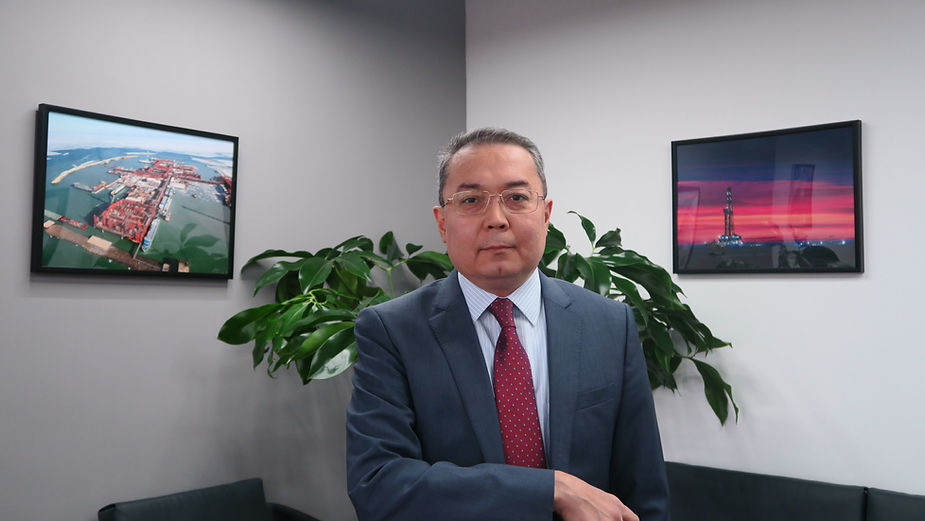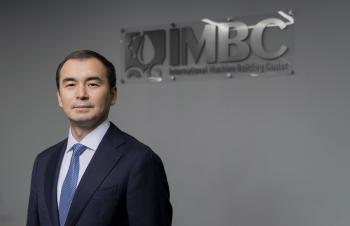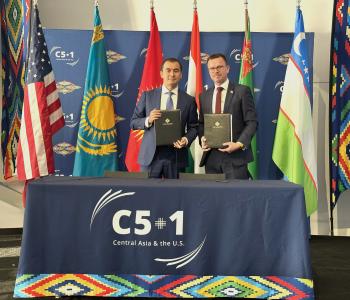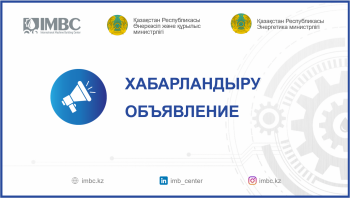Long-term plans: Marat Karimov about IMB Center

To learn about the current status of “International Center for Development of Oil and Gas Machine Building” (IMB Center / Center / Association), we spoke to Marat Karimov, General Director of IMB Center. We discussed with him about the beginning of the Center’s activities, its achievements to date and future plans. IMB Center was established in 2021 at the initiative of the Government of the Republic of Kazakhstan. IMBC members are the major oil and gas Operators: Karachaganak Petroleum Operating B.V. (KPO), North Caspian Operating Company N.V. (NCOC), Tengizchevroil LLP (TCO) (hereinafter – Major Operators / Operators).
The main purpose of IMB Center activities is to contribute to the development of the production of oil and gas goods in Kazakhstan, linking major Operators with Republic of Kazakhstan's machine building industry through Center’s analyses, technical support to manufacturers in the development of opportunities for the production of oil and gas goods and investment facilitation initiatives.
Could you please tell us about the current situation in the oil and gas machine building industry of Kazakhstan.
Today, the output of the machine building industry is less than 3% of GDP (2.8% in 2021), while the share of oil and gas machine building accounts only for 5% of the sector or 0.1% of GDP. These macroeconomic indicators point to the low role of the industry in the structure of the economy, considering the high potential, multiplicative effect on related industries and strategic importance, as it is one of the key sectors with export potential.
The development of in-country value is a complex task in which the development of local capabilities in the machine building sector plays a major role. We believe that to date, it is advisable to continue developing the competitiveness of domestic producers by increasing their potential in producing new domestic goods in accordance with international standards at the three major oil and gas projects (Tengiz, Karachaganak, Kashagan), as this is the main driver for increasing export potential of local manufacturers and further access to foreign markets. Capacity development will have a positive impact on increasing the confidence of Operators in local manufacturers, creating a number of potentially reliable partners for investors and Original Equipment Manufacturers (OEMs).
We believe that our engagement with local manufacturers and the development of their capabilities to the level of the Operators' requirements will increase their competitiveness in local and international markets and open an access to export potential.
The main activities of our Center are to consolidate and analyze Major Operators potential demands for goods and potential of the domestic market, to support local oil and gas manufactures advocacy issues, to attract investors to the oil and gas manufacturing industry and technology transfer from international and OEM companies.
Could you please tell us more about the work being done on demands analysis?
Regarding demands data analysis, in 2021 the Center conducted an extensive demands analysis and processed more than 35,000 line items of goods on three commodities, namely valves, electrical and instrumentation for the next 10 years and identified 19 types of goods that are forecasted to be in high demand by three Operators.
This year, the Center received Operators demands data and began analyzing the market for new commodities: pumps and seals, line pipes, process filters, and HVAC. We have received over 55,000 line items of goods in these categories, and we are in the process of completing the analysis to identify high-demand goods for the upcoming years.
In general, the outcome of the work in this direction will be a list of top-priority goods, on the basis of which potential producers will be identified for further capacity development workstream.
What can you say about the direction of domestic market analysis?
In general, manufacturers are interested in participating in the Center's capacity development initiatives. In most cases, manufacturers are interested in practical steps in terms of adapting their production, namely the required international standards and certifications.
According to our foundation documents, IMBC ensures that all potential oil and gas machine building manufacturers are involved from all available sources.
Thus, to date, the Center has conducted an analysis of the domestic market of manufacturers of valves, electrical and instrumentation commodities. Based on the data received from various sources and following the study of such an extended list of more than 90 potential manufacturers was formed, of which the Center visited 72 enterprises who confirmed the interest to IMBC’s initiatives. Based on the results of the site visits, over 20 potential manufacturers were identified, for whom further work on capacity development and elimination of barriers were proposed. All interested enterprises are provided with quantitative and technical specifications of priority goods that were previously unavailable to the market.
A similar exercise is underway for the new four commodities. Pre-qualification questionnaires have been sent to manufacturers from the extended list for further analysis, including ethical due diligence and expressions of interest. Based on the results, a list of potential manufacturers with the capabilities to produce the identified priority goods will be identified. As of now site visits have been carried out for a preliminary assessment of their production capabilities and further selection for the next phase of capacity development.
What advocacy issues have been identified and are there any feasible results already?
The Center has worked to identify the barriers that prevent local manufacturers from supplying goods to major oil and gas projects. First, Kazakhstani biggest oilfields are challenging - large-scale reservoirs with high-pressure collectors bedded under the conditions of the high H2S content and heightened temperatures require significant experience and necessary equipment to develop. Stakeholders have high expectations for oil producers to ensure workforce and environment safety, effective management, and operations reliability. To provide goods for such challenging oilfields, local manufacturers have to obtain the international certificates and standards ( e.g. ASME, API, IEC, ATEx, etc.), which bear high costs and requirements. Second, tax matters related to local manufacturers. Third, insufficient compliance with existing quality management systems, HSE standards and quality assessment performance. Forth, lack of qualified personnel and their development, i.e. engineering staff and narrow specialists also ceased many opportunities.
In order to fully realize local potential, within its competence and capacity, and following an analysis of the existing barriers in the industry, the Center has developed an action plan that includes such issues as: supporting local business with complying to international standards and obtaining certificates; greater information exchange with the local market; the clarification on the issues of VAT exemption for local manufacturers in respect of with imported goods; more accessible use of special economic and industrial zones for localization of production and distribution of goods in the region. In addition, the Center provides recommendations on how to improve the effectiveness of existing state programmes and support instruments.
As of today, one of the advocacy issues regarding VAT can be noted. The Center together with the Kazakhstan Foreign Investors' Council Association (KFICA) has initiated a number of letters and clarification meetings with the State Revenue Committee of the Ministry of Finance of the Republic of Kazakhstan. Thus, written confirmation was received on the applicability of the RoK Tax Code norms regarding zero-rate VAT contracting opportunities. It should be noted that prior to this clarification, different interpretation and understanding of the RoK Tax Code, Kazakh manufacturers supplying products of their own production to NCOC and TCO had no practice of applying the above norms and faced certain difficulties in their application at the regional level. This information was communicated to manufacturers directly and through Akimats of oblasts and cities of national importance.
Another important issue is the cost of the above-mentioned certificates which can be as high as 120 million tenge or $250,000 per one certificate, depending on the readiness of the production facilities of a particular manufacturer, as well as the specifics of the products to be certified. The expenses for international certificates include both basic costs related to payments to the certification body and indirect costs such as implementation consultancy, testing of manufactured products, training of personnel, as well as costs related to audits of the enterprise.
To address this issue, the Center has initiated a proposal to the Government of Kazakhstan to increase the threshold for the reimbursement of most of the costs of local manufacturers for international certificates. Work is currently underway with MIID RoK and the operator of this programme QazIndustry to amend the current programme and will be discussed as part of the review of the 2023 Republican Budget.
I would like to emphasize once again that the purpose of the center is to provide non-financial support for increasing the competitiveness of local manufacturers in the development of production of equipment and machinery for their further operation by Operators.
What is the status of investment and technology transfer work?
The Center has drawn up an extended list of international companies and OEMs, examining their localization plans and advising on relevant support measures.
So, in 2021, the Center signed MoUs with four international and domestic investors. Honeywell (USA), together with local partners, launched production of explosion-proof temperature transmitters and control system cabinets this year, and production of gas detectors is also planned to be launched. PetrolValves (Italy) together with a local partner launched production of valves. Sigma Solutions (Kazakhstan) has established production of explosion-proof electrical distribution boxes.
Also, since the beginning of 2022, eleven new MoUs have been signed with various foreign companies and OEMs. Opportunities for localization of production are also under discussion with other foreign manufacturers.
What efforts need to be taken to make Operators-manufacturers relationship more successful?
In order to ensure successful participation and competition of local manufacturers in the market of major Operators, the main development efforts should be undertaken in a systematic manner. Barriers and development efforts should be addressed jointly with the participation of all stakeholders, as in-country value development is a complex task in which the development of local capacity in the machine building industry plays a key role.
Manufacturers need to make consolidated development efforts to meet international standards; take a proactive and sustainable approach to capacity and capability development; actively use government support measures, development initiatives; ensure staff competence and productivity and reduce labor turnover through staff development and retention programmes.
International experience shows that direct support measures for local manufacturers are still an important task even in most developed countries. In Kazakhstan there are various public and private financial instruments available to support the economy as well as the machine building sector, but their scope and coverage do not allow for a comprehensive realization of the industry's potential. Therefore, there is an urgent need to support local manufacturers to develop their capacity, as this will serve as a starting point for the complex development of the industry, in-country value and export potential.
We know that IMB Center arranged a forum in May, would you please tell as a bit more about the event?
Yes, the forum was conducted on 13th May in Astana with the support of the RoK Ministry of Energy and RoK Ministry of Industry and Infrastructural Development as well as with participation of the major Operators. The forum was dedicated to the development of oil and gas machine building industry.
This was the first forum we organized and the main objective was to present the work carried out by the Center, providing a platform where interested parties could raise questions and get answers from competent parties. In this way, representatives of government agencies spoke about the work being done in the country's manufacturing sector, while major customers, represented by Operators, shared the results of their local content development activities, including measures taken as part of their procurement activities. We believe that such events will facilitate more effective interaction between industry players, customers and regulators.
We have received positive feedback from participants and believe that it is important to hold such events on a regular basis. For our part, we now plan to hold such forums on an annual basis.
Other news



